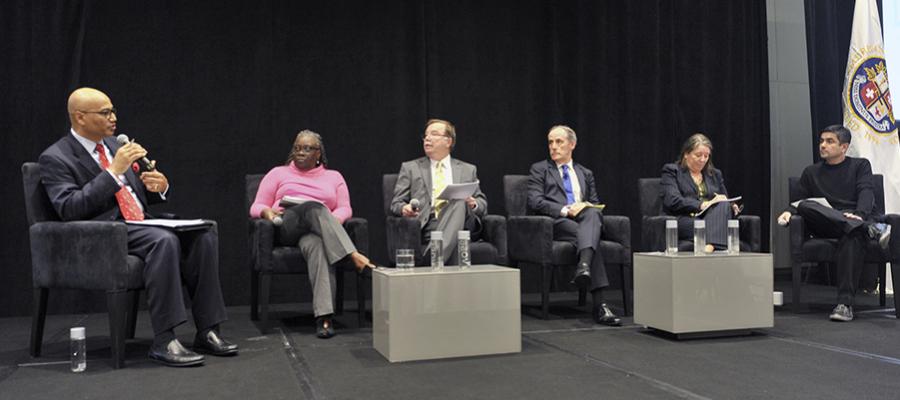Innovative Affordability Strategies for All Types of Hospitals, Health Systems

Pictured from left to right: Kim Byas, Sr., PhD, regional executive, AHA and moderator; panelist Mary Blunt, senior vice president, Sentara Healthcare; panelist Thomas Priselac, president and CEO, Cedars-Sinai Health System; panelist William Flagg, director of community relations and development, Cary Medical Center; panelist M. Michelle Hood, president and CEO, Eastern Maine Healthcare Systems; and panelist Sanjay Malaviya, president and CEO, RL Solutions
The hospital field has no shortage of innovative ideas. It’s managing those ideas that takes finesse, a panel of hospital leaders said at a recent AHA Executive Forum in Chicago.
“If you were to ask me what our No. 1 challenge as an organization is, it’s managing the multitude of priorities that we have underway,” said Thomas Priselac, president and CEO of Cedars-Sinai in Los Angeles.
While innovation is always top of mind at the health system, it cannot occur without internal alignment, as well as the right financial and human capital, which can be a highly competitive undertaking.
Still, Priselac said his organization was eager to tap into the country’s “incredible explosion” around digital innovation. It created Cedars-Sinai Accelerator Powered by Tech Stars, a business incubator that works in concert with Cedars-Sinai’s physicians and researchers to improve health care delivery.
The health system also partnered with MemorialCare in Fountain Valley, Calif., to launch a venture capital fund to heighten care quality, strengthen patient experiences and lower care costs. The partnership empowers health and medical tech companies to access the clinical and technical expertise of the two health systems.
Any financial return from the partnership is second to the goal of ultimately creating products that “all of us can use to either improve the quality of care or make it more efficient,” Priselac said.
Michelle Hood, president and CEO of Eastern Maine Healthcare Systems, said her organization faces care delivery transformation challenges unique to rural environments, such as lack of commercial payers, and it can be challenging to get the commercial payers to engage in discussions about different payment models.
As a result, Hood and her team are proactively reaching out to employers, patients and potential patients.
“We are engaging in a very active educational approach,” Hood said. “We’re introducing some of what we’ve learned from other service industries around consumerism … we have to engage people before they need our services. And we have to speak with the employers who are payers and the many small companies across Maine.”
Eastern Maine Healthcare Systems, which is part of an accountable care organization, has a long history of “being on the leading edge, not the bleeding edge,” of innovation, Hood said. In addition to becoming part of an ACO early on, the system regularly embraces what Hood calls “coopetition” — or collaborating with competitors. This includes successfully co-designing its community health needs assessment with other providers within and outside of Maine.
“We’re trying to erase those state boundaries and remind everybody that we’re all in this together,” Hood said.
William Flagg, director of community relations and development at Cary Medical Center, also in Maine, agreed. He discussed the medical center’s efforts to eliminate any semblance of competition with the area’s federal qualified health centers in order to best focus on the needs of patients, as well as synchronizing communication across hospital board leadership, the FQHC and other executives.
“It’s usually a competitive model [with FQHC],” Flagg said. “But we collaborate with inpatient and outpatient case management so the patient is discharged from our hospital and the FQHC outpatient case manager takes over. That’s been a really big plus.”
In addition to embracing competition, flipping the script on health education is key in rural areas, Flagg said. This includes working with the media to highlight positive messages around enhancing wellness, directly engaging the community through wellness challenges and even being the bearer of bad news.
“We thought, ‘why don’t we encourage people to eat a plant-based diet?’” Flagg said. “Now, you can imagine how well that went over in our agriculture community and our dairy industry.”
Even with initial resistance, that urging paid off. Approximately 200 patients have adopted better eating habits. That number may seem small, but “When you think that every patient who has cardiovascular disease over their lifetime [incurs a] cost of about $750,000,” the savings rapidly add up, Flagg said. “Every time you have an impact on one patient, that’s a big deal.”
Community integration also resonated with the panelists.
Mary Blunt, senior vice president at Sentara Healthcare, said it crossed an innovation milestone by incorporating Managed Long Term Services and Supports (MLTSS), which works through capitated Medicaid managed care programs. MLTSS has helped Sentara expand home- and community-based services in an inclusive way, Blunt said. And although there were financial risks associated with this way of doing business, providing the MLTSS service goes hand-in-hand with being a traditional Medicaid provider, she said.
Blunt said the process pulled back the wool on aspects of care that her team had fallen out of touch with. “[We learned] how to live again on that Medicaid dollar and that Medicare dollar again, which was critical,” she said. “And we really wanted to get our handle around disparities of care. [Until then] we were only touching it tangentially.”

